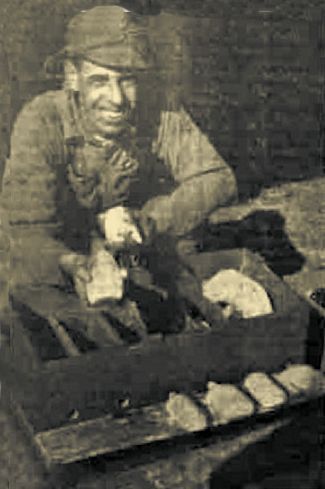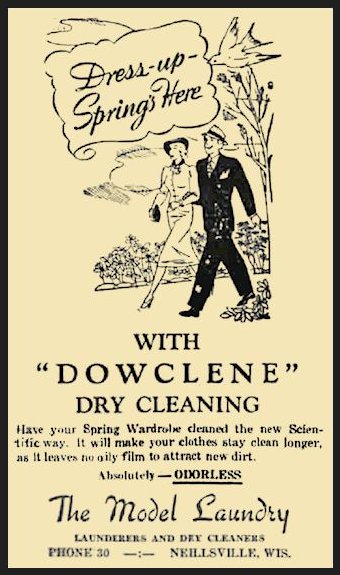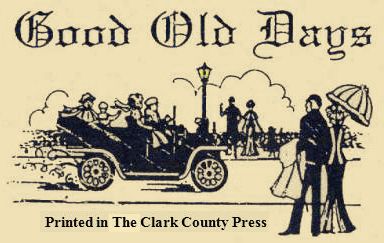|
|
|
March 31, 2021, Page 9 Contributed by "The Clark Co. Press"
Extracted by Dolores (Mohr) Kenyon.
Index of "Oldies" Articles |
Clark County News
March 30, 1939
‘Nursing stalls’ for pigs made by a Grant man
Lloyd Manley conserves feeding time and baby porkers
Pigs Is Pigs,” so a book is entitled.
And, to Lloyd Manley, Grant Township farmer living a mile and a quarter north of Granton, “pigs are money,” and money is scarce.
So, it was no wonder that he got his think-cap on last week and devised a unique feeding “trough” for the six little pigs disowned by the sow which furrowed them. He wanted to save all of them he could, for he believes hogs will be high this fall.
Many farmers facing the problem have been known to set down a pan of milk for the little fellows and leave them to look out for themselves. Because they didn’t know how to stick their snouts in and lap, many have died. After all, a young one’s first instinct concerning food is to suckle.
Other farmers have fed them one at a time with the aid of a spoon or a bottle. But that takes time. And Mr. Manley is a busy farmer.
So, think-cap sitting straight, he found a large, oblong box and partitioned the inside into six small “stalls.”
Then on one end of each stall he drilled a hole large enough to stick a nipple through. The holes were the right height so that the pigs could reach them. On the outside, just below the line of holes, he nailed a board on which to rest the bottles.
Now, at feeding time - and that comes every three hours - he puts each of the “orphan” pigs into a stall. In the meantime, Mrs. Manley heats up a pan of milk with a little syrup mixed in. That is a ration the Manley’s feed their own healthy year-old baby.
Once the meal is warmed, Mr. and Mrs. Manley bottle it, stick the nipples through the holes, and the little pigs do the rest. They all feed at once, saving time. And they all know how to suck, saving pigs.
All six of them now are nearly two weeks old, and every one of them is growing, squealing plenty and getting fat. All the attention they require for feeding is about five minutes out of every three hours.
The sow, which disowned her offspring, had a litter of 10. Two of them were killed by her before Mr. Manley was able to rescue them. Another two have been adopted by another sow which lost two of her litter of 12.
“Pigs Is Money” to Manley

| When one of Lloyd Manley’s sows turned on her pigs, Farmer Manley took them away from her. To save time in feeding, and to save the pigs for the good market he anticipates, Mr. Manley built a “nursing stall” (above). Now all six feed at once - and on the same milk mixture the Manley baby is being brought up on. (Taken from the Mar. 30, 1939, issue of The Clark County Press.) |
*****
Farmer walks 12 miles through mud to school
The burning desire to some Clark County residents to become American citizens can scarcely be realized by those who have been fortunate enough to have been born under the flag.
This fact was brought out forcibly last week Thursday when Joe Slachetka of Thorp, route three, was seen plodding through six miles of ankle-deep mud toward the naturalization school meeting in the Withee High School.
Six long miles through the mud tramped Joe to reach the school and undertake his studies along with about 12 others who attended the first of the naturalization schools in the county. And, after the school had adjourned until the next week, he was seen slowly plodding through the mud toward his farm, six miles away.
One of the impressive things about Joe’s insistence on attending the classes is that his final papers for citizenship have been refused twice. “Knowledge of the English language, poor,” stated the refusal both times. But Joe – and others of Clark County’s foreign population – are seriously intent on becoming American citizens.
Ben Frantz, clerk of circuit court, who has been in charge of arrangements for the naturalization schools, said this week that the time of the school in Withee probably would be changed to Wednesday evening. The first school there was held in the afternoon last week, but many who would like to attend were unable to do so because of the time the class was held.
The school at Thorp will continue to be held at 7:30 p.m. each Thursday until the hearings in Neillsville, June 13.
Poor roads, in many instances, also prevented several of Clark County’s applicants for citizenship from attending the schools last week. Mr. Frantz said he has received many letters from these people explaining this and excusing themselves for not being present.
*****
Spring cleaning for the streets of Neillsville
The paved streets of Neillsville are now receiving their spring cleaning. Men of the street department began Thursday morning on Hewett Street, in front of the library, and worked northward. They are sweeping the pavements first and will then flush them down.
“We know that the paved streets have been dusty because of the dry spring,” said Bert Dresden, chairman of the council committee on streets. “The cleanest way to get rid of the accumulated dust and dirt would be to flush it into the sewers. In Neillsville, however, this is not practical because we have no storm sewers. Our sewers are all sanitary sewers, the largest being ten inches in diameter. The cleaning of them is difficult; they are not only small, but the manholes are far apart so that it is difficult to get at the sewers for cleaning purposes.
“It may surprise some local citizens to know that during the winter we threw upon streets between sixty and seventy yards of sand, this being used upon the ice to give traction and prevent accidents. This would be the equivalent of twenty or more truckloads, an amount of sand which would clog some of the smaller sewers in Neillsville.”
Club group to study trout rearing ponds
A committee of five was appointed to look into the locating of trout rearing ponds in southern Clark County at the meeting last Monday night of the Southern Clark County Conservation Club in the Grant Town Hall.
The committee members are Lewis Bradbury, Charles Prust, Alva Klumpner, Allen C. Covell and Clark Brooks.
Discussion also was held by the members present on the club’s activities for the coming year in raising pheasant chicks. The club hopes to receive about 250 chicks from the state game farm early in June and will keep them from eight to 10 weeks before liberating them in the southern part of the county.
George Polkinghorne of the state game farm at Poynette was present at the meeting and showed interesting motion pictures of sports, fur bearers and birds at the farm.
A board of directors meeting was held following the general meeting.
*****
Chamber directors talk over program
Club to sponsor second annual home and garden contest
Directors of the Junior Chamber of Commerce meeting Tuesday night mapped out a tentative program for the club’s civic activities and approved the personnel of standing committees for the ensuing year.
The tentative program of activities included a second annual Better Homes and Gardens contest on which action will be started in the near future with George Glass again in charge. He will be assisted by other members of the agricultural committee, composed of A.H. Van Gorden and Arthur Kunze.
Committee appointments approved included:
Executive committee, Robert Harvey, A.E. Russell, Glen White and Joe Zilk; advisory committee, Robert Schiller, Willard Allen, Lester Zaeske and Hubert H. Quicker; membership, Kenneth Wagner, Morris Svirnoff and Fred Seif; entertainment and program, Gerry Halverson, Robert Schiller, L.M. Millard and Joe Zilk.
Sports, Milo Mabie, Allen C. Covell, Henry F. Ott and Lester Zaeske; inter-club, Jake Hoesly, Elmer Georgas and Calvin Mills; publicity, P.C. Ludovic and A.C. Wagner; agricultural, George Glass, Arther Kunze and A.H. Van Gorden; businessmen’s committee, A.E. Russell, John D. Harvey, George Prochazka, Arthur Berger, Frank Hepburn, D.A. Peterson and D.E. Peters.
Auditing, H.H. Quicker, Morris Svirnoff and Harry Roehrborn; and Bugle committee, A.C. Wagner, Milo Mabie, Robert Schiller, Lester Zaeske and Glen White.
*****
No peas to be canned in Neillsville in 1939
The J.B. Inderrieden Co. will not operate its cannery in Neillsville in the 1939 season. No contracts will be made with local farmers for peas. Instead of putting up more stock, the company will attempt to work off the stock now on hand, consisting of 200,000 cases of peas in warehouses and 400,000 cases of corn.
Although the plant will not operate this season, the manager, C. W. Peacock will remain in Neillsville, and will have the help in the office of his daughter, Alice. But there will be no other help. In the event of shipment of stock in any quantity, with extra loading, help will be employed as needed.
The decision not to operate locally was reached when it was evident that the market was not showing marked improvement with the advancement of spring. The present price of canned peas is 70 cents per dozen, but those same peas cost the Inderrieden Company and average of 97 cents per dozen. So that, in selling on the present market, the company would lose 27 cents per dozen or 54 cents per case. This loss runs to $500 per car.
The failure to operate the local plant will result in a change of program, and perhaps some disappointment to about 245 local farmers, that being the number normally making contracts with the company. To them this was a cash crop.
Notwithstanding the closing of the local plant, the company will operate two plants in Wisconsin - those at Rice Lake and Barron. These plants are only 10 miles apart and are selected for 1939 operations because of ease of management. In the vicinity of those plants the company will contract for about 2,800 acres of peas, to be used mostly in filling special orders, in cans of a size not now in stock.
*****
Greenwood
Mr. and Mrs. Christ Keiner and daughters, Louise and Freda, and Mr. and Mrs. Henry Keiner spent Sunday visiting relatives at Pittsville.
The American Legion Auxiliary will meet Tuesday evening, April 4, at the Legion Hall. Hostesses will be Mrs. C.A. Mason, Mrs. Christina Moberg and Mrs. Hugo Quast.
Mrs. Christina Moberg spent several days visiting her daughter, Miss Lavina Moberg, at Minneapolis.
Mrs. P.W. Gullord is visiting her son and daughter-in-law, at Montclair, N.J.
Mrs. Henry Keiner entertained members of the Easy Aces Bridge Club at her home Monday night.
Mr. and Mrs. Ed Buker spent Sunday visiting at the Charles Neff home at Neillsville.
Mrs. J.S. Andrews entertained members of the Merry-Go-Round Club at a 6:30 dinner at her home Wednesday night, March 29. The evening was spent playing bridge.
*****

¤¤¤¤¤¤¤¤¤¤¤¤¤¤¤¤¤¤¤
|
© Every submission is protected by the Digital Millennium Copyright Act of 1998.
Show your appreciation of this freely provided information by not copying it to any other site without our permission.
Become a Clark County History Buff
|
|
A site created and
maintained by the Clark County History Buffs
Webmasters: Leon Konieczny, Tanya Paschke, Janet & Stan Schwarze, James W. Sternitzky,
|

